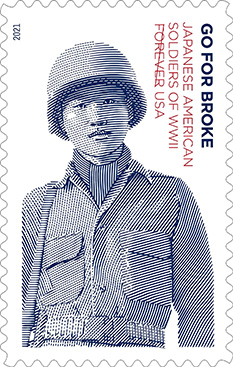JULY 31, 2024 – (Cont.) Back home other Nisei were exerting a different kind of courage in quite a different sort of combat. One of the leading “soldiers” in this regard was a conscientious objector by the name of Gordon Hirabayashi, who worked tirelessly in the pursuit of justice. A Ghandi-like character, he exercised unusual forms of civil disobedience, pressing for acknowledgment of the government’s hypocrisy in its wholesale disregard for civil rights and the Constitution. No stranger to prisons, his crusade eventually found traction: on May 29, 2012, President Obama awarded Gordon posthumously the Presidential Medal of Freedom. As he presented the award to the hero’s family, the president quoted the clever and indefatigable advocate: “Unless citizens are willing to stand up for the Constitution it’s not worth the paper it’s written on.”
During the war, however, there were plenty of white Americans who were all too eager to rip the Constitution to shreds. In Facing the Mountain the author acquaints us with some particularly disturbing examples. Sure, there were the brainless and violent hellions who derived cruel humor from torching and shooting up a Japanese-American family farm when after the war the newly released family had dared to return to their California farm. But the most outrageous words and actions came from highly prejudiced federal judges handling trials of Nisei “no no boys” in Utah, Idaho, Wyoming, Arkansas and Colorado.
In these trials due process was barred from the courtroom and convictions were a foregone conclusion before evidence or argument was presented. One judge refused to recuse himself for his outspoken dislike for the ethnic background of the defendants. He was on record as having said that the “United States should send Japanese-Americans back to Japan and then sink the island.” He ordered that all 63 resisters from the Heart Mountain concentration camp in Wyoming be tried together. At the outset of the “trial” he addressed the group as “you Jap boys” and rejected out of hand their constitutional arguments.
Another federal judge—the former governor of Idaho—ordered 33 Nisei defendants to stand trial, each separately, but in such summary fashion, as many as four trials were held each day. Defense lawyers were often unwilling “volunteers” nabbed by the judge to appear at trial—purely for the sake of . . . appearance.
It was one thing for a store manager or café owner to post a sign, “No Japs Served Here.” What was quite another was the egregious discrimination on the part of federal judges schooled in the law and sworn to uphold the U.S. Constitution. An American simply cannot read this without being reminded of the MAGA slogan emblazoned on millions of T-shirts and red caps of our day. Not all .in our past was so “great.”
Yet, in Facing the Mountain the author pays tribute to patriots who did represent greatness; who did stand up for justice. One such person was Judge Louis Goodman of Eureka, California. At the end of the trial of 27 Nisei draft resisters in a community that was openly hostile to Japanese-Americans, he roundly condemned the prosecution. “It is shocking to the conscience,” he said, “that an American citizen be confined on the ground of disloyalty, and then, while so under duress and restraint, be compelled to serve in the armed forces, or be prosecuted for not yielding to such compulsion.” He then dismissed all charges against all the defendants. Unfortunately, the good Judge Goodman lacked the jurisdiction to order their release from custody. They were escorted back to their concentration camp until the war ended.
The shocking account of our treatment of Japanese-Americans is rendered all the sharper by the broader context of the times: our all-out confrontation of fascism in the fiercest war ever fought. Facing the Mountain compels a re-examination of our past, our present, ourselves. This is a good thing, for whether we acknowledge it or not, self-criticism is an essential element of good citizenship. It’s why the First Amendment is just as essential to our freedom, liberty, and ultimately even more important—to the common good. Every Republican, as well as Democrat . . . and every American, irrespective of political alignment, should read this book. Right, left, or center, whoever does read Facing the Mountain will be made a better American citizen.
Subscribe to this blog and receive notifications of new posts by email.
© 2024 by Eric Nilsson

1 Comment
I hope the book mentioned Gov. Ralph Carr of Colorado, who permitted the construction of the Amache camp, and welcomed Japanese Americans to it and made sure the residents were treated better than at most such facilities. He was opposed to internment, but couldn’t stand up to the federal government’s dictates. He was widely criticized for “coddling the enemy”, and his kind treatment of Japanese Americans (relatively) cost him his political career.